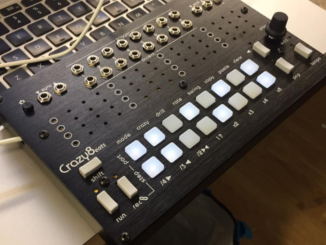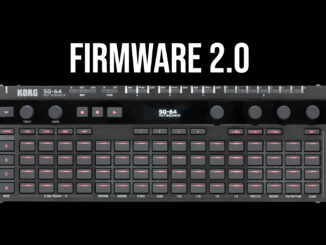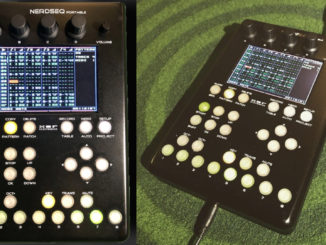Polyend combines retro Tracker workflows and modern sound technologies (wavetable, granular…) into a super portable & affordable music instrument.
Now it’s official! Polyend has today announced the availability of the Tracker, a new hardware tracker based audio workstation. Polyend says: “effectively extracting the best bits of yesteryear’s tricky tracker software classics and rebooting them with forward-looking functionality as the world’s first hardware tracker, deftly designed as an easy-to-use compact standalone workstation with immediacy and simplicity at its creative core, and aiding artists with forging unique avenues of sonic construction to boot”.
Tracker features the essential characteristics of classic trackers (vertical timeline, powerful sequencer, mechanical keyboard…) and combines them with a new super stylish interface with a lot of tactical controls. The central point of the interface is a large, crisp high-resolution screen with a big jog-wheel on the right side.
Further, it features 48 backlit multi-functional silicon pads for quick notes and pattern value entry including different scales. Very good here is that these controllers offer all visual feedback. For facilitating transport, it offers arrow keys for navigation control and buttons for insert, copy/paste, delete/backspace, shift keys.
Impressive Sound Engine
The sound engine looks very potent on the sheet. Buyers of this audio workstation get a lot, much more than the previous Tracker instrument offered. It offers an instrument section with a chain of tools (volume, tuning, panning, filters, reverb send, and ADSRs) to make an instrument from any sample. In this section, you can choose which technology you want to use to process samples:
- Sampler: choose from different play modes (1-shot, forward, backward, and ping-pong)
- Slicer: slice samples manually, or let Tracker take care of it ‘automagically’ at any time
- Wavetable: full-blown wavetable synthesis with variable table length to make it compatible with the most popular (Ableton Wave & Serum) standards
- Granular: single grain, yet very powerful granular synthesis to create crazy and futuristic sounds from old and boring samples
There is also an easy-to-use sample editor that includes multiple effects. The built-in sample recorder can record up to two minutes of 16-bit/44.1kHz samples using built-in Radio, Pattern selection, Mic or Line In inputs, all of which can be saved to the included (16GB) MicroSD card for later use or loaded directly into a project. Very impressive what the developers have built-in here.
with Tracker, users can quickly and easily use existing sample libraries, record new ones, or use the built-in FM (Frequency Modulation) radio. Record samples, play them, slice them, mash them, or even make a synth out of them!
Classic Tracker, Redesigned
In a classic tracker instrument, the vertical sequencer is the heart. This is also the case in the newly developed Polyend Tracker. It comes with up to 48 instruments and 256 patterns with a maximum of 128 steps per pattern per project. That should be enough playroom for most musicians.
Tracker also plays nicely with other instruments thanks to its bi-directional MIDI implementation. So you can use it to sequence and control external gear or be controlled as a sound module by any external MIDI software or hardware devices. The sequencer features automatic filling, randomiser, probability, selection rendering, effects per step, live recording, batch parameter editing, micro-tuning, micro-timing, rolls, and much more besides.
Compatibility With MOD Files
a computer file format primarily used to represent music, made up of a set of instruments (in the form of samples), a number of patterns (indicating how and when the samples are to be played), and a list of what patterns to play in what order — allows users to import and finish tracks from way back when or export and finish their Tracker creations in modern-day software trackers.
The world’s first hardware tracker is slick, light, and portable. It is also energy efficient, so will work with any USB (Universal Serial Bus) power source. Sturdy and compact, the retro form factor of software past with forward-looking functionality makes for a great music creation companion — in the studio, on the run, or on stage. Simply put, Polyend’s Tracker puts everything right on track as a ‘back to the roots’ experience like no other!
Portable
What we have seen now sounds very exciting. All the more impressive for me is the fact that you can power this audio workstation with tons of sound tools with a simple power bank. So you can make music wherever you like (couch, flight, park…) There was a lot of discussion about the price. Is it now $ 499 or $ 999. Now, this discussion is over.
Tracker will cost 499€/$599 USD and comes complete with a USB-A power adapter, 2m USB-C cable, 3.5mm to 2x 6.3mm adapter, Minijack to MIDI DIN adapter, 16GB MicroSD card, and MicroSD to USB-A adapter, and is available to purchase through Polyend’s growing global network of authorized dealers. Shipping starts in June 2020.
More information here: Polyend Tracker




Be the first to comment